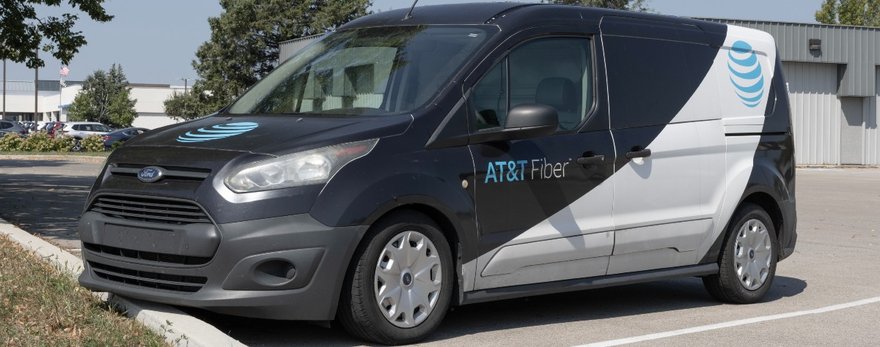AT&T announced plans to acquire Lumen Technologies’ consumer fiber assets, ending months of speculation on plans by the telecom giant to expand its fiber portfolio and by Lumen in exiting its consumer fiber business.
The deal calls for AT&T to pay $5.75 billion for all of Lumen’s Mass Markets fiber business. This includes a network spanning more than 4 million locations across 11 states and serving approximately 1 million customers. AT&T will not be taking on Lumen’s enterprise fiber business or its copper-based consumer business.
The Lumen network will expand AT&T’s fiber reach into new metro areas, including Denver; Las Vegas; Minneapolis-St. Paul; Orlando, Florida; Phoenix; Portland, Oregon; Salt Lake City; and Seattle. It also bolsters AT&T’s fiber plans from what were originally set to pass 50 million locations by 2029, to now reaching 60 million locations by the end of 2030.
AT&T had been reportedly in talks to acquire Lumen’s consumer business for several months. Those initial reports indicated a potential acquisition price of $5.5 billion.
CEO John Stankey during the carrier’s most recent earnings call would not bite on those rumors, but did say he was keeping “my mind open to something that I think can improve value for the shareholder that's clear and centered on what we have laid out as our key strategic thrust in the business and that's to be the best in connectivity.”
The Lumen deal continues AT&T’s own organic fiber expansion and fiber partnerships like its Gigapower joint venture with venture capital firm BlackRock. Those moves are keeping AT&T ahead of telecom rivals Verizon and T-Mobile US, both of which are also pressing further into the fiber space.
Verizon just last week received regulatory approval for its $20 billion purchase of Frontier Communications. The deal when combined with its legacy assets will push Verizon’s fiber footprint to more than 25 million locations across 31 states and serving approximately 10 million customers.
T-Mobile US also recently closed on its acquisition of Lumos and is in the process of acquiring fiber provider Metronet through another joint venture. Those two deals will provide T-Mobile US with a fiber network passing up to 15 million locations, with T-Mobile US management hinting that it could look for additional fiber expansion.
“I don’t want to sort of speculate on rumors and all that stuff, but I think we’ve kind of mostly shown our hand here,” T-Mobile US CEO Mike Sievert said during the carrier’s first-quarter earnings call of its potential appetite for more wired broadband infrastructure. “We're a growth company, … what you see is our interest in 5G broadband that has made us the fastest-growing overall broadband company in America for 13 quarters. And you've also seen us show our hand in terms of wireline internet as having an increased interest relative to other things in pure-play fiber.”
Lumen’s consumer fiber exit
The AT&T deal also facilitates Lumen’s vocal plans to exit the consumer fiber business.
“We've been very consistent in saying we're proud of the consumer fiber platform we've built, but the investment and return profile are not consistent with our desire to focus on the enterprise connectivity and services market,” CFO Chris Stansbury noted during Lumen’s latest earnings call in regards to rumors about that exit.
Stansbury during an investor event earlier this year frankly explained that Lumen did not “have a right to win” in the consumer FTTH space.
“I don't think there's any disagreement that that market is moving to one of convergence where the sale of wireless, as well as fiber to the home in that bundle, allows a strategic buyer, if you will, to drive more enablements, more penetration, less churn, more stable pricing,” Stansbury said. “It's just an economic scenario that Lumen couldn't deliver without that wireless offering. And our footprint is really valuable.”
That value was a significant driver for Lumen.
Stansbury told that investor conference audience that a potential sale of its consumer fiber business would “fundamentally change the financial landscape for Lumen, because it would allow us to, at close, eliminate 25% of our debt. It would mean very little loss in EBITDA [earnings before interest, taxes, depreciation, and amortization] because our fiber business today is in investment mode to drive penetration. And it would mean that we walk away from a continued investment of a billion dollars a year in the consumer business.”
Stansbury during the earnings call noted that the vendor was able to refinance $2.4 billion in term loans that reduce its annual interest expense by around $55 million and pushes full payment of those loans from 2029 and 2030 out to 2032. Johnson also added that Lumen remains on track to squeeze $1 billion in cost reductions by the end of 2027.
Those cost-saving initiatives allowed Lumen to actually pay down some debt despite posting a drop in overall financial performance during the quarter. Lumen is also banking on new artificial intelligence (AI)-related growth opportunities.




